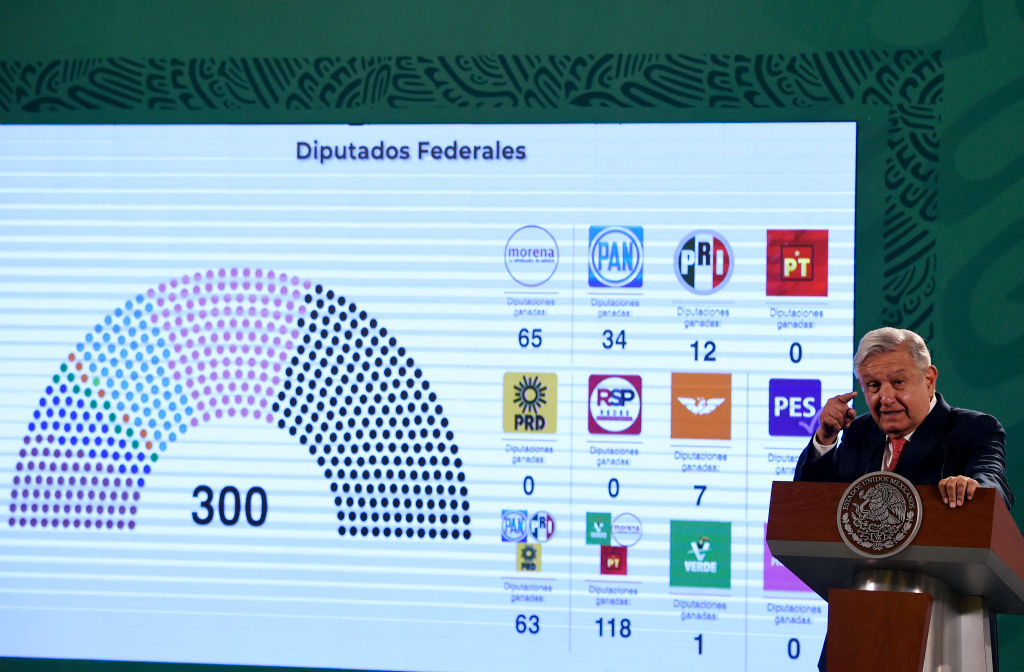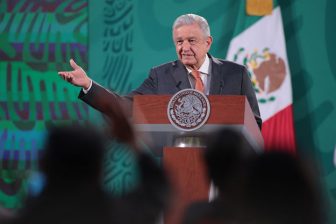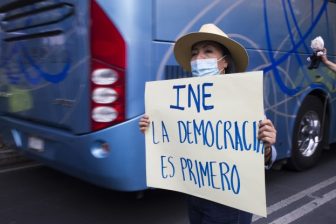Mexicans went to the polls on Sunday in a record-breaking election: by number of posts to be filled — close to 20,000 — by number of candidates and ultimately, by turnout as well, with 52% of voters casting ballots.
The results were mixed for the governing party, MORENA, which was able to grab several governorships (projected to have won 9 to 11 out of 15 up for grabs), giving the party a strong political platform ahead of the 2024 presidential election. However, MORENA and its allies lost the 334-seat supermajority in Congress, and President Andrés Manuel López Obrador’s supporting coalition now has a projected absolute majority of 279 seats.
The results show the opposition in the Lower House will be able to “function as an effective check and balance on executive power,” according to Goldman Sachs Investment Research. MORENA and the president, or AMLO as he’s known, will need to engage in negotiations to achieve any constitutional changes.
AQ asked several observers to share their reaction to the election.
Martin Castellano, Head of Latin America Research at the International Institute of Finance (IIF):
Potentially disruptive institutional changes that could put macroeconomic stability at risk will likely be avoided due to the election outcome, which should support the economy in the short term. Having said that, we still expect policies to become more interventionist in the second half of AMLO’s term. The ruling party remains the largest single legislative block and won most of the state governorships at stake in the election.
Increased state intervention in the economy could exacerbate ongoing challenges to sustain investor confidence, calling for tight monetary and fiscal policies. With idiosyncratic factors gradually becoming more relevant, policy headwinds would continue to drag down private investment, weighing on the recovery. So, the most likely post-midterm elections scenario is “contained policy radicalization”. While this scenario means maintaining macroeconomic stability, it also implies the economy could return to secular stagnation after the rebound from the COVID-19 shock, which does not bode well for Mexican assets in the medium term.
One thing to watch is that weak activity after the recovery from the pandemic could pave the way for increased social tension. Still AMLO’s high popularity is likely to stave off immediate pressure.
Genaro Lozano, Professor of Political Science and International Relations at Iberoamerican University and Political Analyst for Reforma and ForoTV:
With respect to Congress, MORENA is pretty much right where it was. The party and its allies were not able to secure the two-thirds “supermajority” needed for constitutional reforms. But MORENA’s coalition will continue to have an absolute majority, thanks to its alliances with smaller parties, including the Green Party, which increased its number of deputies and was the big winner among smaller parties.
In general, MORENA made progress in the states, sweeping governors’ races and, it looks like, elections for local legislatures too. But the big loss for MORENA was in Mexico City, the typical bastion of support for López Obrador. Here, MORENA is clearly losing the vote of the educated middle class. In other cities, too, like Monterrey and San Pedro Garza in Nuevo León, and Zapopan and Guadalajara in Jalisco, MORENA is going to have to work hard to get back these voters.
Looking ahead, I’ll be watching to see if MORENA reads these results as a mandate to mediate, to negotiate more, and to convince rather than to impose. I’ll also have my eye on the 2024 presidential race. After these elections, MORENA’s Claudia Sheinbaum, the mayor of Mexico City, is weakened after MORENA losses throughout the city. The frontrunner for 2024 remains Foreign Minister Marcelo Ebrard.
Ana Paula Ordorica, Columnist at El Universal and Host of “A las Tres” on ForoTV:
One good sign was the great electoral participation: Over 52% of registered voters went to the polls. In a midterm election it is noteworthy. The polarized scenario in this case seemed to drive citizens to go out and vote.
A main result is that MORENA finds itself hostage to two parties that are a symbol of what the president has criticized so much. One, the Labor Party (PT), has had only had one leader in more than three decades: Alberto Anaya, who is very close to former president Carlos Salinas de Gortari who AMLO has repeatedly signaled as head of Mexico’s “Mafia of Power.” The other is the Green Party (PVEM), which has not, since its inception in 1990, been interested in Mexico’s biodiversity. PVEM’s party leaders already said they will evaluate if they will continue their alliance with MORENA, a declaration that suggests they will demand increasingly more from the president’s party in return for their continued support.
Going forward, it will be important to keep an eye on MORENA’s alliance with PVEM. What will they demand of the president and will it be sustainable? Also to watch is whether the coalition of the PRI-PAN-PRD parties will manage to maintain their alliance once in the legislature and vote as a block. The PRI voted many times with MORENA in the recent legislature.
Carlos Bravo Regidor, Political Analyst and Associate Professor at the Center for Economic Research and Teaching (CIDE):
The most important implication of this is that López Obrador will no longer have the possibility of changing the constitution alone or with his allies. He will need to negotiate and reach agreements with opposition parties and will no longer be able to push his projects through the legislative branch with the ease with which he had been able to until now. I don’t think this means he will become more conciliatory, maybe the contrary. He may become a lot more ruthless, but that is just speculation.
Some other important takes: The governors races seem to be a clear win for MORENA. And while AMLO’s coalition lost seats in the lower house, MORENA itself did not lose seats. In fact, the party may win a few more. But the expectation was that they would do a lot better, and in that sense, it is a disappointing result. AMLO’s supporters had increased expectations, saying they were going to win in a landslide.
In short, in the lower chamber MORENA stays resilient but the government coalition as a whole is weakened. And MORENA’s biggest loss is in Mexico City where they will lose several local mayoralties. The key now, and what we need to watch, is how lopezobradorismo will deal with their parliamentary weakening.







